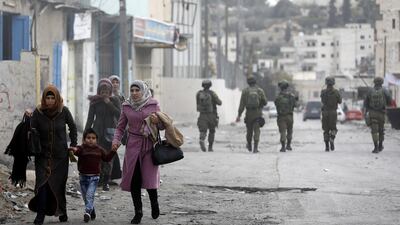Literary anthologies bring together a riot of writers' voices. In rare cases, the assembled works echo and bounce off each other in ways that make a fresh, new mosaic of art. More often, opening a collection is like entering a crowded party, a bit like Arab Women Voice New Realities, which has been edited by Roseanne Khalaf and Dima Nasser.
As you enter this 27-story anthology, there will be some people you know: Oh, hello Hanan Al-Shaykh! You might not remember me, but I've read a few of your novels. There will be many more you probably don't, and the anthology gives you a chance to get acquainted.
Khalaf, who previously edited Hikayat: Short Stories by Lebanese Women (2006), writes in her introduction that, this time, short stories and essays were easier to find. She suggests that, "the novel is no longer the culture's favoured literary form".
Of the 27 stories, six were originally written in Arabic, and all of these were translated by women. The book is thus a women’s-only party, separated into eight overlapping sections.
The stories that greet the reader at the door are from the first section, titled Bold Journeys. The opening works are by three well-known authors: Zena El Khalil, author of the popular Beirut, I Love You; prize-winning Iraqi novelist Inaam Kachachi; and acclaimed Palestinian author Adania Shibli.
El Khalil's Grace sketches a portrait of the black hole that remains after a friend's death. The piece shuttles between Israel's 2006 bombing of Lebanon and the protagonist's trip last year to India.
This is not about the moment in the news – the 2006 bombing – but what comes next. At the time, it seemed like the entire world was interested in her life, even wanting to help. But the day the media stopped reporting, moving on to a different crisis somewhere else in the world... people like her were left behind.
The second story Nude in Waziriyya of Baghdad, written by Inaam Kachachi and translated by Rula Baalbaki, foregrounds the French widow of a famous Iraqi sculptor.
__________________
Read more:
Book review: Leïla Slimani's Lullaby is a worthy read that will chill its readers
Book review: Secret Passages in a Hillside Town is a magical and inventive tale from Finland
Book review: Troublemakers offers a riveting look back on the early days of Silicon Valley
__________________
The widow journeys to post-war Baghdad with her husband’s ashes, where he wanted them scattered. Although the government had wanted the sculptor to return, the Minister of Culture is not exactly pleased when the widow shows up with an urn:
“I seek Allah’s protection! We are Muslims, not Hindus, and cremation is taboo. Haram! Take this thing away from here, madame, I implore you!”
In Waziriyya, the widow collides with an aspiring young sculptor, and things change. “At that very instant, my Baghdad visit was transformed: it sprouted wings and a beak like no one could ever imagine.” And while the story’s feminist ending has a tinge of French colonial triumphalism, it remains sweet and surprising.
The third story, This Sea is Mohammad Al-Khatib's, by Adania Shibli, is free of the romance of Kachachi's story. After all, Al-Khatib just wants to get to the beach. He lives in the West Bank city of Hebron, about 80 kilometres from the Mediterranean. In her relentless and circular style, Shibli tries to get Al-Khatib to the sea. At first, she sends him over Allenby Bridge, through Jordan, on a flight to Cairo, and up to the Rafah crossing – but that's closed. On other versions of the journey, Al-Khatib reaches the sea, but only for an hour.
As with much of Shibli’s work, there is a dark, uncompromising humour. What happens when Al-Khatib arrives at the sea, runs toward the waves and calls to them in Arabic? In one scenario, “The sea will call the police to inform them about this shouting and running.” That doesn’t end well.
The second section is called Shattered Lives and features characters who are circling around loss. In A Paper Nest, written by Iraqi author Irada Al-Jubouri and translated by Michelle Hartman, a woman remains frozen in grief long after her son's death. Yet as we spend time with her, we realize her inability to emote isn't just about her son. She had been frozen before his death, unable speak about her then-husband's abuse.
The woman at the centre of Hanan Al-Shaykh's The Angel is shattered in a different way. Her 28-year-old drug-addict son collapses at a party in Beirut. The mother tries to get her guests out of the house, but they remain, offering advice. One guest asks for 15 minutes alone with the son, and this absurd intervention is transformative, if only for a fragile instant. The story's end is both an epiphany and a mockery of the literary epiphany.
By the time the reader reaches the middle of the anthology, it is densely packed with young women's stories that centre around Beirut. Some are sharp and funny, such as the reflections on dating in Youmna Bou Hadir's Close Enough. Others are similar in their middle-class portraits of home and belonging, parental expectations, perfectionism, depression, self-doubt, and the love-hate relationship with Beirut.
The anthology could have offered a more diverse range of aesthetic visions, as well as writers from a wider range of backgrounds. Also, the editors’ footnoting of common terms such as medina and Sharia positions the stories a bit too starkly as “teachable” texts.
However, as a party of fresh literary voices, in Arab Women Voice New Realities there are a number of new voices you can meet, enjoy and hope to come across again.

